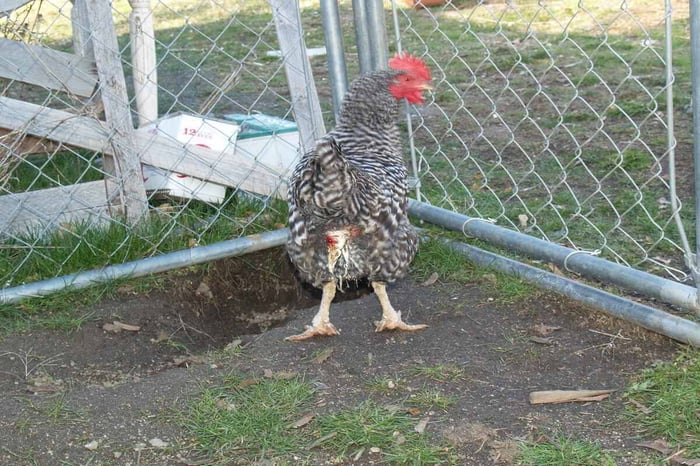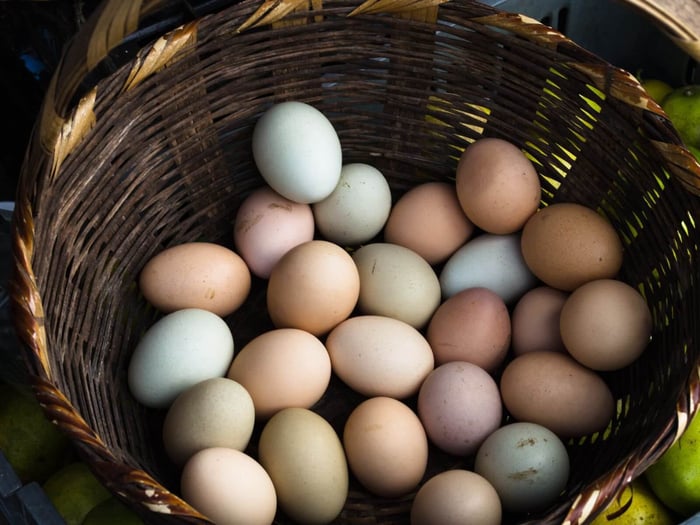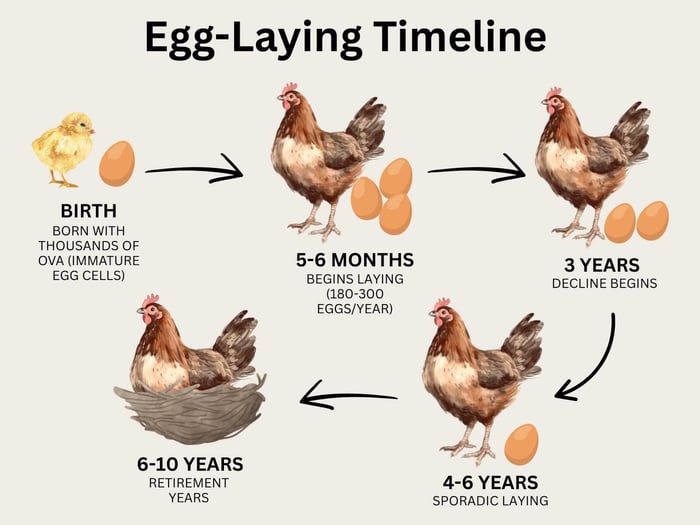Table of Contents
Raising chickens is like having a little piece of farm life in your backyard. The clucks, the fresh eggs, the quirky personalities—it’s a joy. But every now and then, you hit a bump, like when one of your hens becomes an egg bound chicken. That’s when an egg gets stuck inside her, and let me tell you, it’s as uncomfortable for her as it sounds. I’ve seen it happen in my own flock, and it’s a real wake-up call. Knowing how to spot an egg bound chicken, what causes it, and how to help is a must for anyone keeping chickens. Here’s my take on it, based on years of tending to my feathered friends.
What Does “Egg Bound Chicken” Mean?
An egg bound chicken is a hen who can’t lay her egg because it’s lodged in her reproductive tract. It’s not just a minor hiccup—it can be painful and, if ignored, lead to serious trouble like infections or even worse. Picture a hen trying to push out an egg that just won’t budge. It’s stressful for her and nerve-wracking for you. The good news? With quick action, most hens pull through just fine.
How to Spot an Egg Bound Chicken
You know your chickens better than anyone. When one’s acting off, it’s usually obvious. An egg bound chicken shows some telltale signs, and catching them early makes all the difference. Here’s what to look for:
- Straining Like Crazy: She’s in and out of the nesting box, squatting, pushing, but no egg comes out. It’s like she’s trying to pass a bowling ball. You might see her waddle awkwardly or puff up her feathers in discomfort.
- Lethargy: Normally, my hens are busy scratching and pecking. An egg bound chicken? She’s just not herself—sitting still, maybe off in a corner, looking drained.
- Swollen Belly: Gently feel around her vent (that’s the egg’s exit point). If it feels hard or bloated, that’s a red flag. I’ve felt that telltale lump before, and it’s a sinking feeling.
- Not Eating: A hen in pain often skips meals. If your girl’s ignoring her favorite scratch grains, something’s up.
- Weird Poop (or None): The stuck egg can mess with her system. You might see watery droppings or nothing at all.
- Looking Miserable: Some hens get vocal, clucking in distress. Others pant or keep their tail down, like they’re just done with the world.
If you see these signs, don’t wait. An egg bound chicken needs help, and fast.
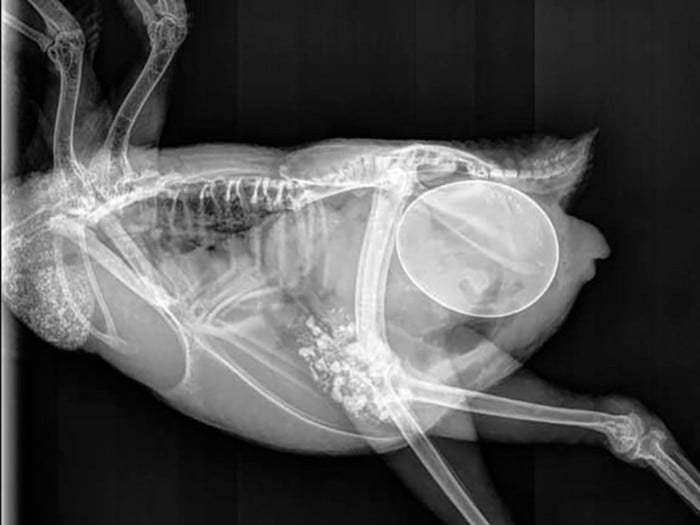 Why Does Egg Binding Happen?
Why Does Egg Binding Happen?
Figuring out why your hen’s an egg bound chicken can help you stop it from happening again. In my flock, I’ve seen a few culprits:
- Big Eggs: Some hens, especially young ones or breeds like Orpingtons, lay whoppers. A jumbo egg can get stuck, especially if the hen’s small or new to laying.
- Bad Diet: Chickens need calcium for strong eggshells and muscles to push them out. Skimp on that, and you’re asking for trouble. Dehydration’s another sneaky cause.
- Stress: Chickens are drama queens. A fox sniffing around, a heatwave, or a cramped coop can stress them out and mess up their laying.
- Chubby Hens: Overfed hens with extra fat around their insides? That’s a recipe for egg binding. I learned this the hard way with one of my girls who loved her treats too much.
- Age or Health Problems: Older hens or those with issues like tumors can struggle to lay. Young pullets, just starting out, sometimes hit a snag too.
- Couch Potato Life: Hens cooped up without room to roam get weaker muscles, making laying harder.
Knowing these causes helps you keep your flock in top shape and avoid an egg bound chicken down the road.
Helping Your Egg Bound Chicken
When you’ve got an egg bound chicken, it’s go-time. Here’s how I handle it, based on what’s worked for my hens:
1. Double-Check It’s Egg Binding
First, confirm the problem. Put on some gloves, grab some olive oil for lubrication, and gently feel near her vent. If you feel a hard lump, that’s likely the egg. Be super gentle—chickens aren’t fans of this exam. If you’re not sure, a vet who knows poultry is your best bet.
2. Keep Her Calm
Move her to a quiet spot—somewhere warm, cozy, and away from nosy flockmates. I use an old dog crate with soft bedding. Stress makes things worse, so keep it peaceful.
3. Warm Bath Time
This is my go-to fix. Fill a bucket with warm (not hot!) water and let her soak for 15–20 minutes, with the water just covering her vent. It’s like a spa day for her muscles—it helps them relax so the egg can move. I’ve seen hens sigh in relief during this step.
4. Lubricate the Vent
After the soak, dab a bit of olive oil or petroleum jelly around her vent. It sounds weird, but it can help the egg slip out. Just don’t overdo it.
5. Gentle Massage
If the egg’s still stuck, try massaging her belly, moving downward toward the vent. Go slow and soft—you don’t want to break the egg inside, which could cause a nasty infection. I’ve had success with this, but it takes patience.
6. Boost Calcium
A calcium shortage might be the issue. I keep crushed oyster shells handy for my flock, but in a pinch, a vet can suggest a liquid calcium supplement. It helps her muscles push that egg out.
7. Call the Vet
If she’s still struggling after a few hours or looks worse—panting, super lethargic, or bloody—get to a vet. They can give meds to kickstart contractions or even remove the egg manually.
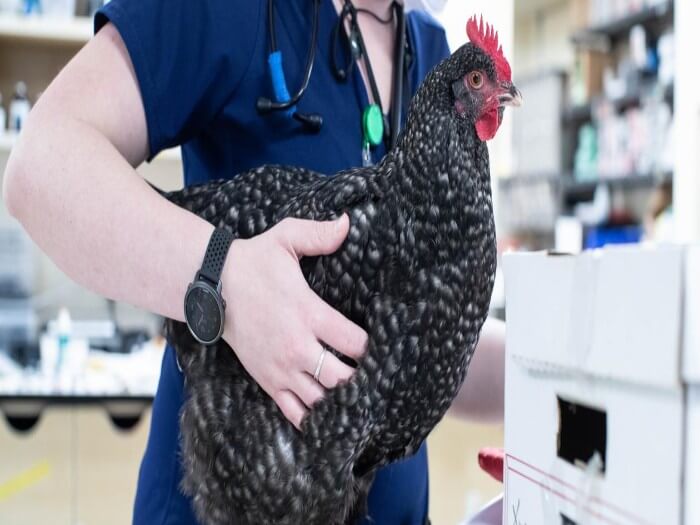 Keeping Egg Binding at Bay
Keeping Egg Binding at Bay
Nobody wants to deal with an egg bound chicken more than once. Here’s how I keep my girls laying smoothly:
- Feed Them Right: A good layer feed with plenty of calcium is non-negotiable. I mix in oyster shells and make sure they’ve got fresh water 24/7.
- Keep Them Moving: My hens have a big run to scratch around in. Exercise keeps them fit and less likely to get bound.
- Chill Vibes Only: I keep predators out with good fencing and make sure the coop’s not too crowded. Happy hens lay better.
- Watch Egg Size: If a hen’s laying monster eggs, I check her diet and health. Sometimes it’s just her breed, but it’s worth a look.
- Regular Check-Ups: I walk through my flock daily, looking for anything off. Catching problems early saves a lot of heartache.
When It’s Time for a Vet
Sometimes, home remedies don’t cut it. If your egg bound chicken is in bad shape—think heavy breathing, blood, or no improvement after a few hours—call a vet. Waiting too long can lead to serious issues like egg yolk peritonitis, which is as bad as it sounds.
Helping Her Bounce Back
Once the egg’s out, keep an eye on her. I give my hens a quiet spot to recover, with extra water and their favorite feed. To keep your egg collection organized and stress-free, consider using a Mango Wood Egg Holder to store those fresh eggs safely. If she’s not laying or acting normal within a week, I call the vet to check for other problems.
Wrapping It Up
An egg bound chicken is no fun, but with quick thinking and a little TLC, you can get your hen back to her clucky self. Watch for those signs, tackle the causes, and keep your flock healthy with good food, space, and love. My hens have taught me a lot about resilience, and every time I help one through egg binding, I’m reminded why I love keeping chickens. Here’s to happy, healthy hens and a coop full of eggs!


.png)
